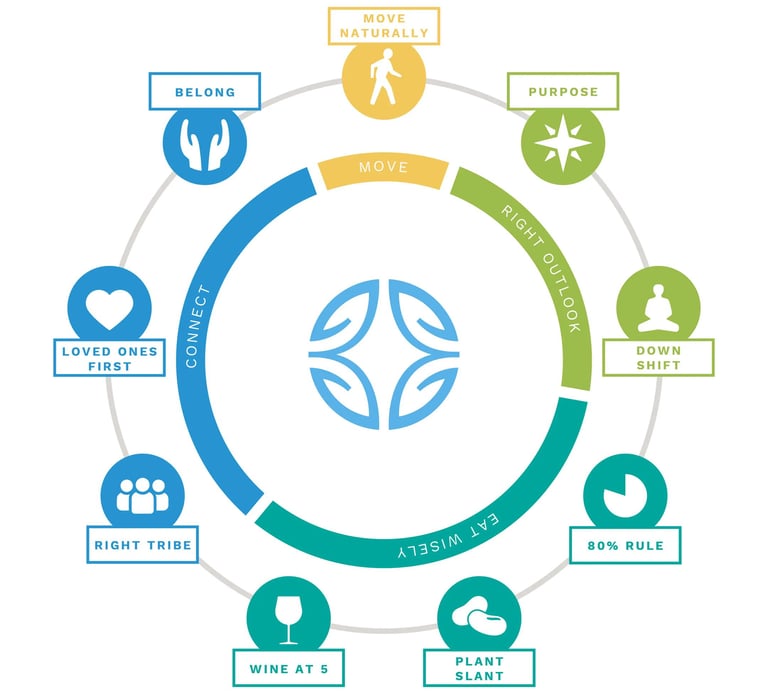Redefining Longevity
The simple ways to live a more enriched and longer life.
HEALTH
12/11/20238 min leer


Lessons
We control the majority of factors that impact our physical and mental capacity. Our habits and lifestyles can drastically change the the length and quality of our lives. It does not appear that longevity is strongly impacted by the amount of wealth that an individual has accumulated.
The Blue Zone lifestyle is more of a framework/blueprint about how we think about longevity. Taking small steps rather than trying to completely redirect your lifestyle may have a significant impact on your future self.
Every person has a finite period of time on this planet; in this post, I share lifestyle modifications to consider adopting to better match how long we live ("life span") and how long we live free from chronic disease or other health problems ("health span").
According to the Centers for Disease Control and Prevention, the average life expectancy at birth of men is roughly seventy-three years and women is seventy-nine years (based on 2021 US data). With the recent passing of my father at the age of seventy-one, I found this statistic interesting, because the average life expectancy does not consider the quality of life of advanced aged individuals.
Since COVID shut down the world in 2020, the routines and lifestyles of individuals like my father were thrown into disarray. My father decided to retire during 2020, because the risks of contracting COVID potentially outweighed the benefits (i.e. social interaction, mental stimulation, and physical activity). Since his retirement, I noticed many lifestyle adjustments he made that could have contributed to his early demise, and this significantly impacted how I view longevity.
After my father's Lewy Body Dementia diagnosis in June, I've been digging into varying causes that could have led to the development and advancement of his condition. This led me to author Dan Buettner, the author of The Blue Zones Secrets for Living Longer: Lessons From The Healthiest Place on Earth and his popular Netflix Documentary "Live to 100: Secrets of the Blue Zones".


(c) 2018 Blue Zones, LLC. All Rights Reserved.
Dan Buettner explores what he calls the Blue Zones, which are small geographic areas where the residents have the highest life expectancy and the highest concentrations of centenarians (individuals living beyond 100 years old). The residents of these select areas exhibit lifestyle choices that we can integrate into our daily lives to increase the likelihood of fending off common ailments that impact the majority of the world's population. The five regions which are identified in the documentary include: the Barbagia region of Sardinia, Ikaria in Greece, Nivoya Peninsula in Costa Rica, Loma Linda in California, and Okinawa in Japan.
As indicated in the diagram above, the broad categories which are explored further are: how individuals move, what type of life outlook they have, what and how they eat, and what types of connections they have. When we review these broad categories, we will notice that all of these categories are all within our control. One unique factor that I noticed while watching "Blue Zones" was that none of the communities investigated exhibited exorbitant amounts of wealth. If anything, they appeared to have less in material wealth but displayed a higher level of overall happiness and satisfaction. This is something that is explored more in depth as each category is further dissected.
Lesson: We control the majority of factors that impact our physical and mental capacity. Our habits and lifestyles can drastically change the the length and quality of our lives.
Moving Naturally
As the New Year approaches, we will soon be receiving tons of targeted ads for the latest exercise equipment and discounts for fitness classes and gym memberships. However, we may want to reconsider whether hitting the gym or signing up for that next marathon is the best way to develop a longevity strategy. Many of the longest living communities integrate non-intensive movement into their daily routines such as house-work, gardening, and walking.
Technology has improved our lives in countless ways; however, this has led to a significant increase in sedentary behaviour, coined the "sitting disease". Health specialists have cited that too much sitting is "an independent risk factor for chronic conditions, including cardiovascular disease, cancer, and type 2 diabetes." By integrating anywhere from 150-220 minutes of low to moderate intensity exercise, we can fend off many of these controllable health conditions as well as improve our overall mental, social wellbeing, and sleep quality.
Having a Purpose
Identifying what drives you to get out of bed in the morning is a strong motivator to move forward on that purpose everyday. Adam Grant, an organizational psychologist and author of a number of best selling books, refers to the feeling of joyless and aimlessness as "languishing". He speaks in depth about what languishing is and how we can get out of the funk in his TedTalk: How to Stop Languishing and Start Finding Flow.
As someone who is very driven, I've hit points in my life where I feel as though I was a boat without a rudder and this has led to a feeling of stagnation and emptiness. Some suggest that finding new hobbies, challenges, enjoyable experiences, and work that can stimulate our curiosity and focus can be a remedy to this feeling and they have referred to this as "flow". Finding a purpose, however big or small, can help you discover the path to take the small steps and build momentum toward more joy, satisfaction, and hopefully flourishing.
Down Shifting
Stress is a silent killer. We encounter both acute and chronic stress throughout periods in our lives and it has a significant impact on our mental and physical wellbeing. There are two types of stress: eustress which has a positive effect on you, while distress has a negative impact. An example of eustress would be weight training or working on fun and engaging projects. There may be immediate stress, but you feel confident in your ability to complete the work out or project with the resources you have. In comparison, distress could include an ongoing relationship issue or a child continuously being bullied at school which can cause mental anguish and sustained trauma. Chronic stress can lead to inflammation, high blood pressure, heart disease and other on-going health conditions. People in the Blue Zones create routines to reduce the amount of stress they experience, such as praying/meditating, taking naps or enjoying happy hour.
80% Rule
It is so convenient to order food today that we don't even need to leave our couches or desks to have food delivered directly to our doors. It is pretty common for most people to consume meals that far exceed their caloric needs which has lead to a significant uptick in obesity rates. According to the CDC (2022 data), 42% of the US adult population is classified as obese and Canada is following the trend at 27%. The associated risks of obesity include heart disease, diabetes, and certain types of cancer. In the Blue Zones, it is common for people to eat smaller meals as the day progresses and some residents, such as the Okinawans eat until their are only 80% satiated to ensure they are not overeating.
Plant Slant
Many of the Blue Zone areas consume a significant amount of veggies, beans, whole grains, fruits, nuts/seeds, fish and poultry. In addition, they try reduce the amount of red meats and sugary foods. Some have suggested that the Mediterranean diet is one of the most popular longevity secrets, because of the high concentration of healthy fats, low sugar, and reduction inflammation causing foods.
Wine
Alcohol may not be for everyone, but it is suggested that drinking moderately on a regular basis with friends/family can offer some longevity benefits. The benefits may be derived from certain antioxidants in wine or the fact that being with friends and family can release endorphins. One thing to note is that drinking alcohol isn't for everyone. There can be negative consequences from ingesting alcohol and those are covered in a podcast that was released by Dr. Andrew Huberman: What Alcohol Does to Your Body, Brain and Health.
Belonging
In an article written by US Surgeon General Dr. Vivek Murthy, he noted that "approximately half of the U.S. adults reported experiencing measurable levels of loneliness". This was further exasperated by COVID and this level of disconnection has affected our mental, physical, and societal well-being. The direct physical impact of poor or insufficient social connection may include a "29% increased risk of heart disease, a 32 increased risk of stroke, and a 50% increased risk of developing dementia in older adults". The vast majority of the centenarians that were interviewed were involved with some type of faith based community and this sense of belonging may have contributed to their overall increased life expectancy.
Loved Ones First
It is no surprise that being around people that bring us joy and show us affection can enhance our lives. In many circumstances, families in the Blue Zones live in multigenerational homes where the parents and grandparents live in the same home. Given the statistics associated with the decrease in onset of disease and lower mortality rates of all inhabitants of the same household (including children), countries such as Singapore are offering financial incentives to have families live in closer proximately to their aging parents.
Right Tribe
Jim Rohn, an entrepreneur, author and motivational speaker, was quoted saying that "you are the average of the five people you spend the most time with". This doesn't seem to be too far off from how the Blue Zoners live, because they value their social circles which support their healthy lifestyles and behaviours. Although our social groups can change over time, studies have shown that the lifestyle choices and activities of our closest circle can be contagious. When we associate ourselves with people who commit to us and our mutual wellbeing, this has positive benefits on longevity.


















Lesson: The Blue Zone lifestyle is more of a framework/blueprint towards thinking about longevity. Taking small steps rather than trying to completely your lifestyle may have a significant impact on your future self.
In summary, I don't believe there is a silver bullet that explains the rapid cognitive decline my father experienced; however, I imagine that he could have delayed the onset of dementia if he had integrated some of these lifestyle modifications. I don't want to live forever, but I do want to live the fullest and richest life possible. I hope that this post gives you some ideas on how to improve your lifestyle.
